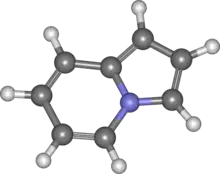Indolizine
Indolizine is an heterocyclic compound with the formula C8H7N). It is an uncommon isomer of indole with the nitrogen located at a ring fusion position. The saturated analogs are indolizidine, which are found in a variety of alkaloids such as swainsonine.[3]
 | |
 | |
| Names | |
|---|---|
| Preferred IUPAC name
Indolizine[1] | |
| Other names
Pyrrocoline; Indolizin; Pyrrolo[1,2-a]pyridine | |
| Identifiers | |
3D model (JSmol) |
|
| ChEBI | |
| ChemSpider | |
| ECHA InfoCard | 100.219.195 |
PubChem CID |
|
| UNII | |
CompTox Dashboard (EPA) |
|
| |
| |
| Properties | |
| C8H7N | |
| Molar mass | 117.151 g·mol−1 |
| Appearance | White solid |
| Melting point | 75 °C (167 °F; 348 K) |
| Boiling point | 205 °C (401 °F; 478 K) |
| Basicity (pKb) | 10.1 [2] |
Except where otherwise noted, data are given for materials in their standard state (at 25 °C [77 °F], 100 kPa).
Infobox references | |
References
- International Union of Pure and Applied Chemistry (2014). Nomenclature of Organic Chemistry: IUPAC Recommendations and Preferred Names 2013. The Royal Society of Chemistry. p. 213. doi:10.1039/9781849733069. ISBN 978-0-85404-182-4.
- Elattar, K.M.; Youssef, I.; Fadda, A.A. (4 May 2016). "Reactivity of indolizines in organic synthesis". Synthetic Communications Reviews. 46 (9): 719–744. doi:10.1080/00397911.2016.1166252. S2CID 100777050.
- Julio Alvarez-Builla; Juan Jose Vaquero; José Barluenga, eds. (2011). Modern Heterocyclic Chemistry. Wiley-VCH.
This article is issued from Wikipedia. The text is licensed under Creative Commons - Attribution - Sharealike. Additional terms may apply for the media files.